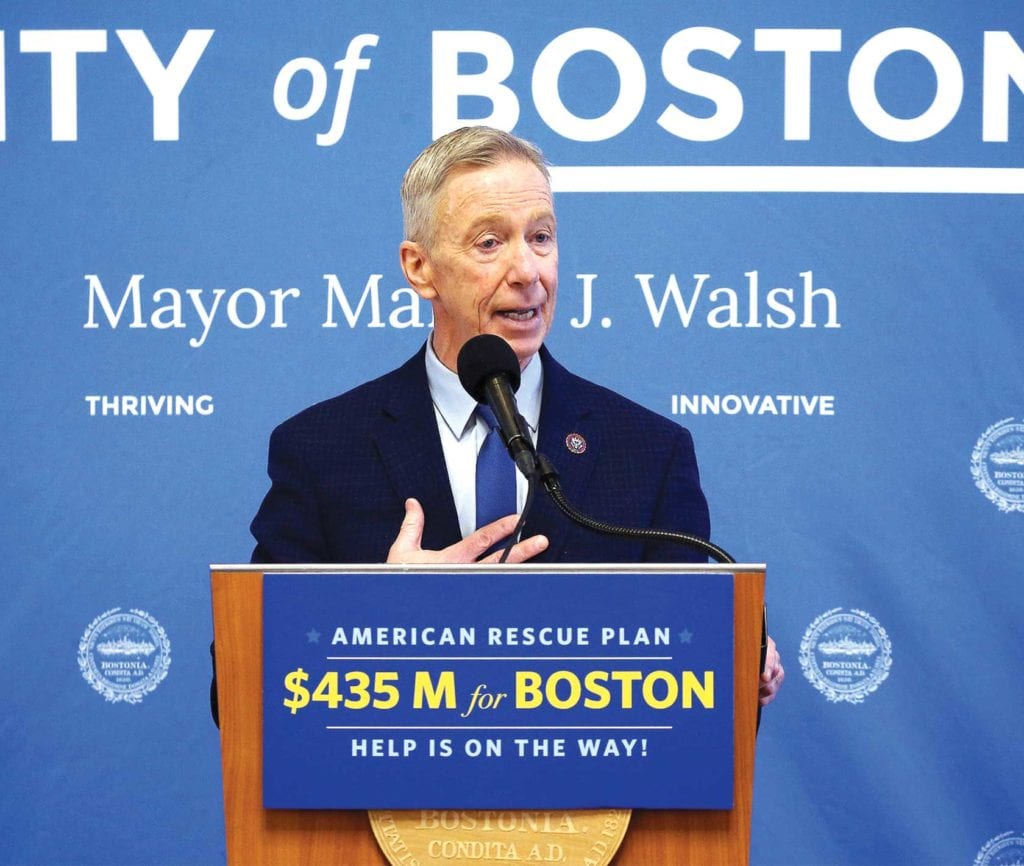Gov’s MBTA cuts draw fire from elected officials
Agency looks to cut service despite federal aid

In December, the MBTA announced planned cuts to service, and the cuts went into effect on Sunday, March 14. Though the changes to more than 35 bus lines, along with reduced frequency and service on subway and commuter rail lines, were protested by transit activists, state lawmakers, city councilors and transit worker unions, Baker administration officials say the cuts are necessary to save money lost in the pandemic.
Key bus lines, including the 29 in Mattapan and the 42 in Roxbury, will have schedule changes.

MBTA officials say they’re moving forward with cuts to service and their workforce despite $250 million in federal stimulus funding. BANNER FILE PHOTO
Given that the MBTA is set to receive $250 million in federal aid from the new stimulus package, many are questioning whether cuts are still necessary. President Biden’s $1.9 trillion stimulus package includes $30.5 billion for public transit nationally.
Congressman Stephen Lynch criticized the cuts, speaking during Mayor Martin Walsh’s press briefing Monday.
“This is taxpayer money,” Lynch said. “So, we take money from the taxpayer and then the MBTA cuts service? That doesn’t work for me.”
Lynch noted that transit authorities in other states receiving federal funding have reversed cuts and increased service, while MBTA officials remain committed to cuts.
“That doesn’t work for us as a Massachusetts delegation,” Lynch said. “I’ve talked to my colleagues, and they are furious about it.”
The Transit is Essential Coalition wrote a letter calling on elected officials to fully fund the MBTA. Rather than cutting service to respond to a dip in ridership at the first wave of the pandemic, they say, fully funding the MBTA will be better for essential workers.
“By restoring all MBTA modes to full service, we can help students get back into classrooms, workers back to the office, and patrons back to local businesses. While life may never look the same as before, there is no future in which Massachusetts can compromise on convenient, accessible, and affordable mass transit,” the coalition wrote. More than 40 organizations, including TransitMatters, the Metropolitan Area Planning Council and Massachusetts AFL-CIO, have signed the letter.
Jarred Johnson, executive director of TransitMatters, spoke to the real effects of cutting weekday and morning service of essential bus lines and said that the MBTA may be using the pandemic as an excuse to enact cuts that they wanted all along. Based on the state’s prioritization of cars over public transit and the FMCB’s allocation for future transit expansion, Johnson says, “it all becomes clear that this is COVID giving them an excuse to go forward with cuts and shrinking the T on an ideological and a partisan basis.”
The FMCB told the Banner that the MBTA will learn more in the coming weeks about the amount of aid they expect to receive from the federal government’s new stimulus package. In January, MBTA General Manager Steve Poftak said the planned cuts were expected to save the agency $21 million. At a press briefing earlier this month, he said the MBTA would be relying on federal money for help — but that money wouldn’t be used to stop the approved service changes.
“It just confirms what I’m thinking,” Johnson said. “They’re saying ‘We’ve got the money, but we’re going to peg service to demand.”
Johnson said he asked his followers on Twitter to send photos of their commute, and all he saw were crowded trains.
With the changes, service is still at 86%, compared to ridership at roughly 30%. According to a service update March 8, MBTA conducted an equity analysis that found “no disparate impacts or disproportionate burdens.”
One organizer plans to do his own equity analysis. Marvin Martin, the leader of Action for Equity told the Banner that in the past, MBTA has been responsive about service changes, but Action for Equity anticipates some disparate burdens on certain populations.
“We are concerned about cutting down on lines,” Martin said, “because there are people who are required to get to work, and that’s the only option they have.”






